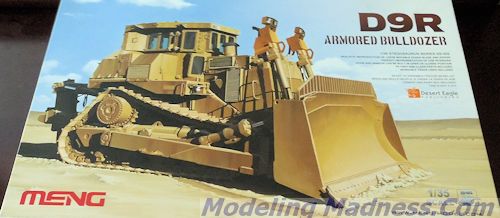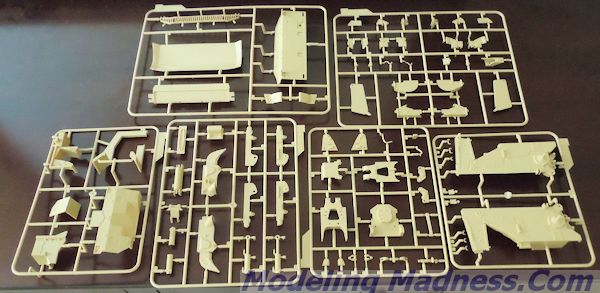
Meng 1/35 D9R 'Doobie' Bulldozer
| KIT #: | SS-002 |
| PRICE: | $90.00 MSRP |
| DECALS: | Three options |
| REVIEWER: | Donald Zhou |
| NOTES: | Includes photo etched parts |

| HISTORY |
The D9R is the latest in a long line of armored bulldozers that are in service
with the Israeli Army. It is powered by a 474 gross horsepower engine, with a
pull weight of 71.5 tons. The first D9 series was produced by Caterpillar in
1954. These bulldozers quickly became popular with many construction firms
around the world due to their reliability, availability and power, including
those in Israel. The Israeli army, lacking many construction/engineering
vehicles back then, quickly appropriated them for use in the Sinai War and
since. They were used to breech obstacles, build fortified positions and clear
debris. During “Operation Peace for Galilee”, D9 bulldozers operated in the
frontline, breeching obstacles, clearing landmines and paving roads. Israeli
troops quickly found out that the unarmored variants suffered heavy casualties
from snipers, roadside bombs and the like. A program went underway to armor the
bulldozers to protect the crew.
The Israeli Military Industry and Israeli Aerospace Industry were contracted to
develop armor protection for the bulldozers, including the D9R. At first, these
only protected the crew cabin but eventually also included major important areas
such as hydraulic systems and engine compartment etc as well. When the D9R
entered service in 2000, a series of new armor were developed and added. In
total, some 15 tons of armor were included, bringing the weight of the vehicle
to 65 tons loaded. Since 2000, the only major threat left to these behemoths are
shape charged anti-armor/tank rockets/missiles. To deal with this threat,
especially RPG’s, the most numerous anti-tank weapon in the hands of Palestinian
terrorists, the Israeli Aerospace Industry developed a series of “slate” (fence)
anti-RPG armor for the bulldozers called Sulamot, which won the IDF Ground
Command Award.
These changes and additions proved to be extremely effective and devastating.
During the many ensuing conflicts, the bulldozers soon found themselves
busy, many drove right into the frontline, under heavy fire to either recover
disabled vehicles (including MBT’s) or outright drive right on through houses
occupied by Palestinian Hamas or Hezbollah fighters. This tactic, known as “Nohal
Sir Lachatz” or “pressure cooker procedure” was developed in response to Hamas
or Hezbollah fighters hiding inside houses taking pot shots against Israeli
troopers. One such incident caused 13 casualties. In response, the Israeli
called two or three armored bulldozers and send them charging at the threat
house all at once. The Palestinian fighters soon found out once these monsters
get a full head of steam with those nasty dozer blades raised, very few weapons
in the world, especially those that are man portable, can stop these things.
Faced with only two choices, either get buried alive or the second one, many
chose the second one, surrender! It was during one of these operations that
killed Palestinian terrorist Mahmoud Tawlbe, who was caught trying to plant a
bomb on a passing Israeli amour and one of the alert D9 pushed a wall on top of
him. Crushing him instantly. However, this tactic, and peace time use of the
same thing, demolition of houses, sometime by rushing armored bulldozers to
crush and destroy the condemned houses can sometimes prove controversial, as
when one D9 crushed American activist Rachel Corrie to death when she was trying
to defend the house of her friend.
These bulldozers soon found themselves doing another dirty, perhaps even more
dangerous job, that of disarming or getting rid of roadside bombs or IED’s
(Improvised Explosive Devices). They soon proved to extremely good at it. Their
armor make them almost impervious to explosions, with at least one surviving a
half ton of explosives. For even more dangerous work, IDF now have remotely
controlled armored bulldozers (D9N) called Raam HaShachar (Thunder of Dawn). In
fact, these bulldozers are so effective the U.S. Marines bought several armor
kit sets for their own D9’s and used them in Iraq.
Despite its combat nature, these armored giants also sometimes find themselves
serving in peace time, such as the Mt. Carmel fires in which several drove
directly into the heart of the fire, under armor protection to push dirt on the
fire or create fire break lines.
Always controversial but extremely deadly and effective, the D9R will remain in
service for years to come. Ironically, the IDF engineers have a rather funny
name for this monster, “Doobi”, which in Hebrew means “teddy bear”…..Some teddy
bear huh? The D9R armored bulldozers can weigh as much as 70 tons fully loaded
(with both the regular armor and the slate armor). It has a crew of two, a
driver/operator and a commander.
| THE KIT |
 The fact of the matter is, I wanted to get this kit when it first came out last
year. The least of which is it’s a rather esoteric subject and would look good
on my M-1070/M-1000 HET transporter (whenever I can get around to that. But
that’s another story). However, things went awry when I got my Trumpeter 1/200
scale USS Missouri instead.
The fact of the matter is, I wanted to get this kit when it first came out last
year. The least of which is it’s a rather esoteric subject and would look good
on my M-1070/M-1000 HET transporter (whenever I can get around to that. But
that’s another story). However, things went awry when I got my Trumpeter 1/200
scale USS Missouri instead.
Ok, warp time to now. With the Missouri project slowly turning into Project “USS
MISERY!!!” (I kid you not),
mainly due to the fact my parents bought me the Pontos upgrade set, turning a 2
year project into 4, I reached burned out stage and needed something new to keep
my interest going. Hence this monster of a “teddy bear”.

The box is pretty big. Not as big as my 1/200 Missouri box, but then again, what
can? (That box can be used as a coffin I swear!) Opening it one is greeted with
24 sprues packed tightly inside. These include 5 black ones (Tracks) with the
rest in the in vogue sand coloring for armor models these days and two clear
ones. Now the two clear sprues are duplicates, one is completely clear, the
other in a slight sky blue tint to represent the coloring of the thick armor
glass that is present on this vehicle. Nice touch! The package is finished with
4 polycaps for the drive sprockets and blade holders, a small photo-etch fret
and a long vinyl string for the exposed hydraulic lines.
Detail definition is definitely top notch, worthy or even beating the best from
Dragon or Tamiya. If you are trying to find a one piece chassis, you won’t find
it here. In fact, the whole entire vehicle is broken into several modular pieces
so the modeler can assemble them in subassemblies and then bring them all
together in the final stages. These include the lower chassis, the big huge
ripper on the vehicle’s back. This ripper is extremely detailed and take no less
than 4 steps. Use cement sparingly on the correct places and it should move.
Then we get into the cabin and the armor carapace that surrounds it. This is
called the “cockpit”. The cockpit contains two well-appointed seats, with
controls etc. before moving to the various armor that surrounds it. This is
where things gets a little complex as these armor pieces are many and thick,
with details inside and out. Again, modeler can select either the clear or the
slight sky bluish clear pieces for the armored glass. Be careful around the
commander’s door and roof hatch and also the driver/operator window as these are
designed to move when finished. It’s at this stage that the nice FN MAG machine
gun is build. However, it should be noted that not all bulldozers are armed with
this weapon since its best offense is simply raise that over 7 foot tall dozer
blade and then run or crush everything over! Check your references! Strangely,
the slate/fence armor is not included as many Israeli vehicles carry them. This
is shown in the instruction book’s introduction article so it’s kind of weird
that it is not included. However, this is a minor quibble since at least one
aftermarket company, Voyager already offers it if the modeler really wants it.
The running gears and tracks are next. The running gear is a simple affair
compared to what went on previously. The tracks are in three pieces and will
require concentration to assemble since if you want them to work when finished,
you have to be really careful and judicious with the cement and there just not a
lot of space for those cement to go on! There is also an ejector pin mark on the
underside of every track shoe, one of the slight disappointment of the kit
though it should be noted once assembled, it can be hardly seen.
After some details on the chassis, we finally come to the business end and the
reason for this vehicle being, the large dozer blade. Even in this scale, it’s
large and impressive, fully almost 8 feet tall in real life. Several pieces goes
into its construction, including various hydraulic cylinders and armor pieces
and two headlamps on those cylinders. Becareful with the instructions here since
there are two versions of these cylinders and both the USMC (use only one
version) and the Israelis use both of them. After finishing this massive piece,
it is attached to the vehicle itself to finally complete it. Three vehicle
markings are included, including an USMC version serving in Iraq circa 2004 and
two Israel versions.
| CONCLUSIONS |
This is one heck of kit that should entertain you for quite some time. The
painting and especially weathering option should be endless. The vehicle itself
is quite large, being almost 2 stories tall in real life and has a mean all
business like look, what with a huge almost 8 foot tall dozer blade in the front
and a massive ripper in the back. Highly recommended. Buy it, drool over it,
build it, paint it and then admire it!
July 2014
Kit courtesy of once again, my own hard hit pocket books.
NOTE: It should be noted that this kit is made in conjunction with Desert Eagle
publishing, which publish a great D9R book should you need some reference on
this awesome vehicle.
If you would like your product reviewed fairly and fairly quickly, please contact the editor or see other details in the Note to Contributors.